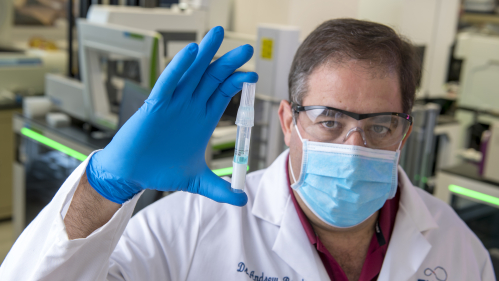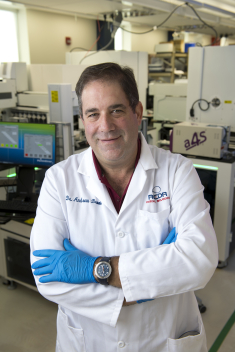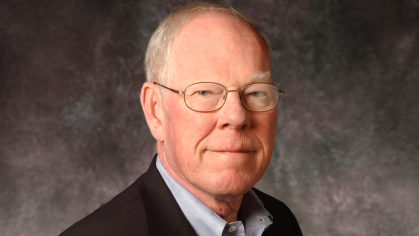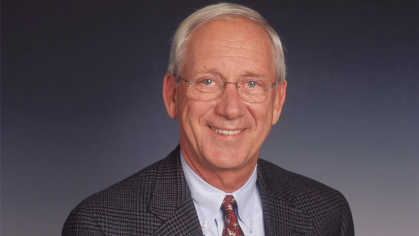Mourning the Death of Rutgers’ Andrew Brooks, a Leader in the Fight Against COVID-19

The pioneering researcher led the development of the first approved coronavirus saliva test
Andrew Brooks, 51, a research professor who led the creation of the first coronavirus saliva-based test, which received FDA emergency approval last spring and has played a significant role in the fight against the COVID-19 pandemic, died unexpectedly on Saturday.
More than four million rapid response tests, which were the first approved for home use, have been performed since March, earning Brooks and his lab's pioneering work recognition in The New York Times, CNN and other national media outlets.
Gov. Phil Murphy recognized Brooks and his contribution to help stem the spread of COVID-19 in New Jersey and around the country, calling him “one of our state’s unsung heroes,’’ in his coronavirus press briefing on Monday. Murphy said the Rutgers COVID-19 test has “undoubtedly saved lives” as he praised the legacy Brooks leaves behind.
“We cannot thank Andy enough for all he did across his career,’’ Murphy said. “He will be sorely missed by many.’’
Rutgers-New Brunswick Chancellor Christopher J. Molloy, Rutgers Biomedical and Health Sciences Chancellor Brian Strom and S. David Kimball, Rutgers Senior Vice President of Research, in a joint statement, said, “We at Rutgers offer our heartfelt condolences to his family, including his three children, and with them we take pride in his achievements that will have lasting impact.”
Jay Tischfield, founder and CEO of RUCDR, distinguished professor of genetics at Rutgers-New Brunswick’s School of Arts and Sciences, and executive director of the Human Genetics Institute of New Jersey, said, “Andy and I were close. We often commented that I was old enough to be his father, and I often thought of him as a son. He will be fondly remembered by the large cohort of scientists whose research he facilitated across many years.”

Brooks was a research professor in Rutgers-New Brunswick’s School of Arts and Sciences in the Department of Genetics, an academic member of the Human Genetics Institute of New Jersey, a research faculty member in Rutgers’ Environmental and Occupational Health Sciences Institute and a member of its NIHS Center of Excellence, and a member of the graduate faculty in Rutgers Joint Graduate Program in Toxicology.
His career was distinguished by outstanding scholarship, service in the field of biomedicine and business activities designed to improve human health. As chief operating officer and director of technology development at RUCDR Infinite Biologics, he led the effort to develop the COVID-19 saliva test. The test received FDA emergency use authorization as the first approved saliva diagnostic and a month later as the first of any test approved for home use.
Born and raised in New Jersey, Brooks received his Ph.D. in neuroscience from the University of Rochester and later became its director of Medical Center Core Facilities. Four years later, he returned to New Jersey to direct the joint Rutgers/UMDNJ EOHSI Bionomics Research and Technology Center. In 2009, he became chief operating officer and director of technology development of RUCDR Infinite Biologics, which, through an asset purchase agreement, was spun out from Rutgers to create Infinity BiologiX, of which Brooks became chief executive officer.
He co-authored more than 70 publications and played a key role in providing consultation, biobanking and analytical services to many large research projects that have yielded insights into the genomic etiology of human diseases and the effects of environmental exposures. He also served 17 years as an adviser to the Food and Drug Administration as director of the Harlan (now Envigo) GeneScreen Laboratory and as co-founding director of the BioProcessing Solutions Alliance.
In his free time, Brooks was an accomplished amateur golfer, often known to play with his father. His skill, concentration and friendly competitive spirit led to victory in international tournaments.
A funeral service will be held on Jan. 28 by invitation only due to COVID-19 restrictions and will also be live-streamed. He is survived by his wife, Jil; three daughters, Lauren, Hannah and Danielle; his mother, Phyllis Brooks, his sister Janet Green and a niece and nephew.


